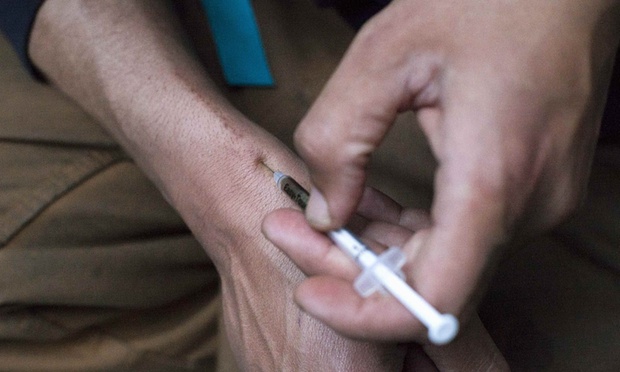UK sees huge rise in heroin and morphine-related deaths
Heroin and morphine-related deaths have increased by almost two-thirds over the past two years, contributing to the mortality rate from drug poisoning rising to the highest level since comparable records began in 1983.
Official figures show there were 952 deaths involving the substances last year – their highest level since 2001 – compared with 579 in 2012, bucking a decline in previous years, according to Office for National Statistics (ONS) figures published on Thursday.
They contributed to the mortality rate from drug misuse rising to 39.9 deaths per million population.
Heroin-related fatalities – which are combined with those from morphine because heroin breaks down in the body into morphine, so either may be recorded on the death certificate – accounted for 42% of total drug misuse deaths.
Harry Shapiro, a drug information and policy analyst, described the figures as “pretty shocking”.
The former director of communications for now-defunct independent monitoring body DrugScope said: “There’s been such a focus on legal highs, new psychoactive substances, that to some extent maybe we’ve been taking our eye off the ball a bit [regarding illegal drugs]. We’ve certainly had declining drug use [in the recent past].
“From a policy point of view, we might have got a bit ‘we’ve ticked all the boxes on this, we’re doing well.’ There are figures here and from the Crime Survey of England and Wales, [which showed a spike in use of ecstasy and LSD among young adults] that suggest we are not ticking all the boxes.”
Public Health England calculated last year that around 60% of drug-related deaths between 2007 and 2012 were people who had not been in treatment at all, or in the previous five years.
Shapiro said the ONS figures raised questions about whether people were being let down by the commissioning process, leaving treatment too early, or being put off by an increasing reluctance to prescribe methadone.
He added that the 2013 abolition of the National Treatment Agency for Substance Misuse had put responsibility for treatment in the hands of local authorities but that they were under extreme financial pressures.
The ONS recorded an increase in the number of deaths involving heroin/morphine across all age groups bar people aged 70 or over between 2013 and 2014. Shapiro said ageing problems could be combining with complications from heroin use to increase the mortality rate.
The ONS highlighted an increase in supply of the drug, after a “heroin drought”, which it said had led to an increase in the purity of street heroin and declining prices, from £74.32 per gramme purity-adjusted in 2011 to £49.55 in 2013. However, Shapiro suggested this was probably the “least controversial version of events”.
He said: “The issue is really: is anyone going to do anything about it and come up with a national strategy to deal with drug-related deaths? It’s not just in relation to morphine.”
Deaths involving cocaine increased sharply last year to 247 from 169 in 2013, reaching an all-time high of 4.4 deaths per million population, according to the ONS. It was the third year in a row the mortality rate for cocaine-related deaths had increased.
Rosanna O’Connor, director of alcohol, drugs and tobacco at Public Health England, described the rise in heroin-related deaths as “a great concern”.
She said: “Fewer people are using heroin but the harms are increasingly concentrated among older, more vulnerable users and those not recently in touch with their local drug treatment services. Reassuringly, overall drug use has also declined and treatment services have helped many people to recover but these figures show the need for an enhanced effort.
“We need to ensure the most vulnerable users can access drug treatment services.”
This article was originally written by Haroon Siddique for the Guardian on 3rd September 2015.






I got this web page from my pal who informed me about this website and at the
moment this time I am browsing this website
and reading very informative posts at this time.
I have just finished reading “Good Cop Bad War” by Neil Woods and although I have always held the view that drugs should be decriminalised this is the first time I have read the compelling argument and proof.